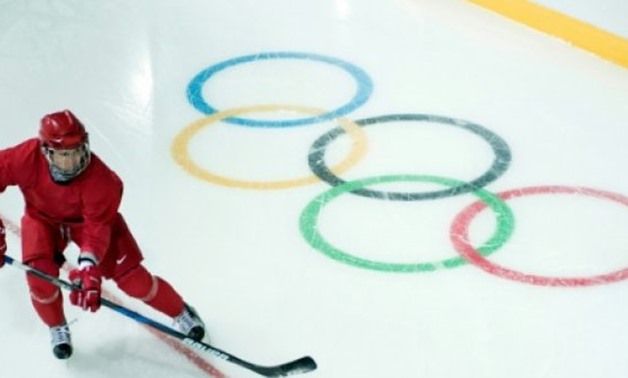
A women's hockey player for the "Olympic Athletes from Russia" team trains in Gangneung. Russia has dominated the build-up to the Olympics, despite officially being banned / AFP / by Peter STEBBINGS
PYEONGCHANG - 7 February 2018: There is a grey door at the Pyeongchang Winter Games media centre with a sign reading "Olympic Athletes from Russia", but it is rarely open and inside there are no Russian flags or colours.
It is a fitting metaphor for the country's participation in South Korea, where the Russian team is suspended over a doping scandal but 167 of its competitors deemed to be drug-free will take part as "Olympic Athletes from Russia".
Despite officially not competing in the Games, Russia, along with North Korea, has dominated debate in the lead-up to Friday's opening ceremony.
Russia was suspended from the Games in December over its systemic doping programme, fined $15 million and its former sports minister, Deputy Prime Minister Vitaly Mutko, was banned for life.
Nevertheless, Russians will still make up one of the largest contingents in Pyeongchang, albeit under a neutral flag -- which means standing to the Olympic anthem if they win gold, and a strict absence of Russian colours.
Under stringent conditions imposed by the International Olympic Committee (IOC), no white-blue-red Russian tricolours can flutter anywhere in public -- not even from apartments in the athletes' village.
Even if a spectator hands them a Russian flag, they must refuse it. Competitors can hang Russian flags on their bedroom walls, as long as they are out of general sight.
Other rules govern what the Russian competitors can wear, even when training or in casual gear.
For instance, they are not allowed to wear any combination of clothing that would create the Russian tricolour -- for example white T-shirt, blue trousers and red footwear.
Their social media will be monitored to make sure they call themselves "Olympic Athlete from Russia" or "OAR".
The Russians do, however, have a strong incentive to comply with the rules: the IOC is considering lifting Russia's suspension in time for the closing ceremony on February 25.
- How did we get here? -
It is all a far cry from four years ago, when Russia hosted the Sochi Winter Olympics and the country soared to the top of the medals table.
For Russian President Vladimir Putin, who had staked his personal reputation on the Games, and the country's 144 million people, it was an immensely proud moment.
But it is that Olympics which helped propel Russia to where they are today at the Olympics: banned and marginalised, a pariah.
Central to blowing the lid on widespread doping across Russian sport was whistleblower Grigory Rodchenkov, the former head of Russia's anti-doping lab.
Rodchenkov, who alleged that Putin personally ordered the doping programme, fled to the United States in 2016 in fear of his life. Putin later ridiculed his claims and called him "an idiot".
That same year, a bombshell report by Canadian lawyer Richard McLaren on behalf of the World Anti-Doping Agency (WADA) accused Moscow of widespread state-sponsored doping that reached its climax at Sochi.
There, said the report, Russian secret agents were part of an elaborate plot to help the country's athletes cheat their way to gold.
The nefarious scheme included swapping tainted urine samples for clean ones using a "mousehole" in the Sochi laboratory wall.
Russia's track and field athletes were consequently banned from the 2016 Rio Olympics and the whole team was barred from the Paralympics. They remain suspended from the Pyeongchang Paralympics.
- What has Russia said? -
Moscow officials have been united in their fury against Russia's continued isolation at the highest level of sport.
There was a rare piece of good news last week when the top court for sport, the Court of Arbitration for Sport (CAS), overturned life bans meted out by the IOC to 28 Russian athletes and staff over doping.
But torpedoing any hopes of a late entry to Pyeongchang, the IOC -- who were stunned by the CAS ruling -- on Monday said 15 of the 28 would not be invited to South Korea.
The rest of the 28 have either retired or are unavailable for undisclosed reasons.
That provoked a furious response from Russian Prime Minister Dmitry Medvedev, who branded it "a shameful decision".
"This decision is unfair, unlawful, amoral and politically charged," he wrote on Facebook, asserting that "its goal is to do political damage to Russia".
- What comes next? -
The number of Russians at Pyeongchang currently stands at 167 "clean" athletes, but on Tuesday CAS said that Korean-born speed skater Victor An and 31 other Russian athletes had launched a last-ditch appeal against their suspensions.
The Russians -- including officials and coaches -- at the Winter Olympics will be closely watched by the IOC to ensure they stick to the rules as neutrals.
An observer group will report back on the final day of the Games to the IOC Executive Board, which could then lift -- or partially lift -- the suspension of the dope-tainted Russian Olympic Committee.
If that is the case, the Russian flag will flutter once more, during the closing ceremony on February 25.
And, presumably, the grey office door will be marked "Russia" rather than "Olympic Athletes from Russia".


Comments
Leave a Comment